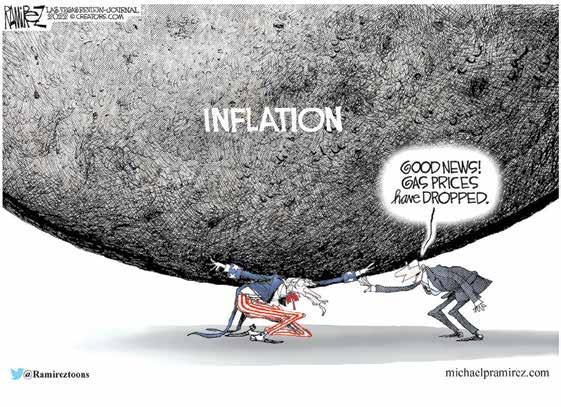
6 minute read
Better Business by Chaim Homnick
Better Business Top 10 Small Business Tips
By Chaim Homnick MA MBA
Editor’s Note: We are proud to bring back a popular columnist, Chaim Homnick, who wrote previously for TJH and returns now with a column focused on business and entrepreneurialism. Enjoy an edifying read as he covers topics of interest, interviews local industry leaders, mentors small businesses, and answers reader-submitted business questions.
Many small businesses were walloped by the pandemic era, whereas others survived or even thrived. The shutdowns proved disastrous for businesses that subsisted month to month, while other companies found ways to pivot successfully or to weather the storm and recover when the world reopened. Of course, supply chain crises and inflation woes have presented new challenges for companies to surmount.
Consequently, most entrepreneurs are more cautious and deliberate now than they were two years ago. It is more vital than ever to be strategic and tactical with your business and its success. Here are some tips to help your business flourish!
Chase Growth the Right Way
Many businesses pursue topline revenue while forgetting that net profits are the goal. Doing $1 million in sales with $900k expenses is more work for less reward than emphasizing healthy margins and achieving $600k in sales against $400k in expenses. So, aim to grow strategically and remember that it is always easy to grow your costs – the challenge is growing your profits.
Maximize Efficiency
Efficiency is how you accomplish successful growth. There is a well-known 80/20 rule, and it manifests in a variety of ways within a company. The theory posits something like this: 80% of the work gets done by 20% of your employees. 80% of your profit/success comes from 20% of your customers. Figure out where your best results are coming from and double down on those areas!
Provide Maximum Value
This seems obvious but often it is overlooked by business owners. In most industries, there is rampant competition. Standing out in a crowded business climate requires determining your core competencies or unique product or service that provides genuine value to your customer. Elon Musk has asserted that a company exists to provide a superior product or service. If you have an inferior product or service, you aren’t going to succeed long-term. Constantly seek ways
to innovate and generate value for your consumer.
Target Your Advertising
The next step, once you identify your potential clientele demographic, is reaching them. This is another tip that seems obvious. But there is a reason why this quote from wealthy retailer and pioneer of advertising John Wanamaker still resonates 100 years after he said it: “Half my advertising spend is wasted; the trouble
is, I don’t know which half.”
That quote is advertising in a nutshell. Determine what the appropriate advertising budget is for your business and then consider ways to hit your target demographic and methods to improve your customer acquisition and retention. Are you in retail? Do you capture emails via your POS system? Is your business mostly fueled by social media, and if so, have you compared campaigns to determine which generate more leads and sales?
knowing your target demographic. Whether your business sells products or provides a service, you need to determine who your primary consumer is and where the market is.
Learn What Resources are Available
There are many resources available to small business owners. Try to learn about any industry-specific resources and also try to become knowledgeable of the various technology systems, loans, grants, mentorship programs, special business pricing and other services or resources that may be useful for you. Don’t just muddle along; seek out ways to thrive!
Know your Numbers
There are so many small business owners who don’t even know what their business is earning (or losing). If numbers aren’t your thing, make sure you have real systems in place or people who understand your business’ finances. You may need a good bookkeeper or accountant or both, but make sure you know the ins and outs of your business backend and your own financial structure. Can you afford that capital investment or a more expensive lease or are you overloaded with debt? Knowing your numbers will also come in handy if you ever decide to sell your business or pursue investment. Investors need balance sheets and P & L statements, not your hastily scribbled guesstimates.
Know Your Cash Flow Health
This is the related corollary to the tip above. It seems obvious, but many businesses were devastated during the pandemic because they were one slow month away from closing. Restaurants and retail were hit particularly hard. Restaurants churn through cash rapidly and often operate month to month, while some retail is cash flow intensive and many retail stores have to forecast and
purchase a season ahead. Analyze your business and stay ahead of your cash flow requirements. You don’t want to end up in a position where your business should be making money but your cash flow is negative and you end up over-leveraged and taking on bad debt at bad interest rates just to fund operations or because you are draining your company’s coffers too quickly for personal needs.
Emphasize Employee Morale
Employee retention has become difficult in today’s market. There seem like an infinite number of available jobs, and employee loyalty is at an all-time low. In some industries, finding motivated employees with a good work ethic has become challenging. Therefore, take care of your employees! Look for good staff and then do what it takes to retain your staff. Foster an environment that lends itself to productivity and positivity.
Schedule Meetings with Yourself
This last one may seem unnecessary, but try it! Lori Greiner, of Shark Tank Fame, said that “an entrepreneur is someone who works eighty-hour weeks to not work forty hour weeks.” Many small business owners feel swamped by their workload and find themselves constantly preoccupied by the myriad small details requisite for keeping the business afloat and operational. But stepping back and assessing your business at a macro level is vital to ensure your business remains healthy and efficient. Take time out to analyze your numbers or your operations, then follow up to improve areas of concern or try new things. Never lose sight of the big picture!
When it comes to small businesses (and big businesses), there are no hard rules. There are innumerable ways to earn money or even to become fabulously wealthy. So, with no set formulas, the best you can do is utilize some of the approaches above to aim for efficiency and professionalism and hopefully that will help you navigate your way through the challenging financial climate we face currently.
Chaim Homnick is a serial entrepreneur who owns several businesses. He also mentors small business owners. If you have questions you would like to see answered in a future column, or other feedback, email chomnick@ gmail.com.
What is something every business owner needs to know when starting out?
Pinny Ackerman, co-founder of PEYD
“Just because you understand your product or service very well, doesn’t mean your customers will understand it right away. I know
what I do and the value my company can bring to clients, but
have I gotten that message out to the public? A top priority must
be educating the public on what you are offering them and what differentiates you from the competition. ” Elimelech Sperling, Owner of Extreme Vent Cleaning & Sperling Productions
“In both of my businesses, I have learned that customer service has to be your primary concern. The service you provide or the
way you communicate with customers is what will make or break
your business. It is also how you differentiate yourself from the competition. ”












